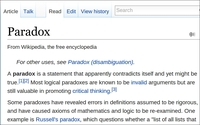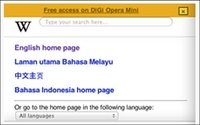The Most Influential Medium Your Brand Can't Influence, At Least Not Directly
- by Joe Mandese @mp_joemandese, April 12, 2014

As far as audiences go, you probably couldn’t find a tougher crowd than the one Wikipedia Founder Jimmy Wales played to when he opened The
Media Kitchen’s annual “Venture Capital Conference” in Lower Manhattan Wednesday morning. The standing-room-only auditorium was packed with some of the greatest skeptics the media
world has ever seen: stoic ad execs and fat cat venture capitalists who have heard it all, and rejected the vast majority of it. But by the time Wales finished presenting a case study of what is the
only bona fide form of sponsorship currently on Wikipedia, there wasn’t a dry eye in the house.
The highlight of the presentation was a recap of the foundation’s fledgling “Wikipedia Zero” initiative, a program that enables telecommunications brands to sponsor free access to Wikipedia for people living in impoverished communities in the developing world.
advertisement
advertisement
What moved the hardened business execs to tears wasn’t the sponsorship model per se, but its outcome:  providing
access to knowledge to people who wouldn’t otherwise be able to afford it. The program, which began more than two years ago, now provides free access to Wikipedia to millions of people sponsored
by more than a dozen carriers in dozens of nations. While there is no explicit advertising involved in the effort, the carriers receive exposure on “free access” banners and links to their
home page, plus the goodwill branding benefit of sponsoring the access.
providing
access to knowledge to people who wouldn’t otherwise be able to afford it. The program, which began more than two years ago, now provides free access to Wikipedia to millions of people sponsored
by more than a dozen carriers in dozens of nations. While there is no explicit advertising involved in the effort, the carriers receive exposure on “free access” banners and links to their
home page, plus the goodwill branding benefit of sponsoring the access.
The program is probably the purest example of an idealized “advertising as a service model” proposed by former Digitas chief David Kenny (now CEO of The Weather Co.) in the Advertising Research Foundation’s 2007 “Online Advertising Playbook,” and could serve as a model for other brand models on Wikipedia. In an accompanying interview with Wales conducted during The Media Kitchen’s event, he says the foundation is open to exploring other ideas with advertisers and agencies, but that it’s unlikely it would ever take on the form of conventional advertising sponsorship.
He says Wikipedia Zero is a good example of how it should work, because it is a model where brands and Wikipedia can come together to benefit the community and help fulfill the foundation’s mission of giving the world’s population “access to the sum of all human knowledge.”
“It’s one of these rare things where it works for them commercially, as well,” Wales told MediaPost Weekend of Wikipedia Zero’s success with mobile carriers, "because we’re right at this inflection point where all these cheap phones are coming on the market in a massive way and people are getting their first way of accessing the Internet, realistically.
"And [the carriers] want to move people from feature phones to smartphones. And people get nervous about that because they don’t know how they’re going to get charged for data, etc., and this is a way to get them comfortable with that. Now they can say to people, ‘Come with us and you’ll get free Wikipedia'."
In the interview, Wales talks more about what brands should not be doing with Wikipedia than what they should be doing, and he notes that is part of the reason why he helped found and runs Wikia, a for-profit social media platform that enables brands to explicitly tap in to their most avid fan base, and actually co-develop content and experiences together. To date, Wikia has had its greatest successes working with entertainment brands, especially video game marketers, but the role of brands -- and agencies -- with Wikipedia represents one of the greatest paradoxes Madison Avenue has ever had to confront.
Wikipedia currently ranks as the fifth-largest publisher online, with more than half a billion unique users and some of the most immediate, frequent and stickiest consumers of content. It’s also one of the most organically optimized in search query results, often ranking No. 1 or No. 2 on Google and other major search engines.
But there is almost no direct way for major brands or agencies to directly influence the process, and as a result few ever even discuss the role of Wikipedia in their strategic planning, communications planning or media planning.
“It has never come up,” acknowledges Shankar Gupta, vice president-strategy at digital savvy agency 360i.
“It is something we were able to do in the early days,” recalls Jeff Semones, president of GroupM social shop M80. He says in the earliest days of Wikipedia, the agency would “build” and edit pages directly on the wiki, but that these days it focuses more on generating content and experiences for its clients’ brands that will indirectly influence the community that manages Wikipedia’s brand-related pages.
Based on what Wales recommends, that is the most logical approach, but it sill doesn’t explain the frustration marketers in some categories -- especially topical ones like TV and movie brands -- must feel when considering the weight Wikipedia carries in generating awareness and interaction with their brands.
“It can be the No. 1 or No. 2 most influential source of digital content for some brands,” says Christian Anthony, co-CEO and co-Founder of ListenFirst Media, ad company that tracks and analyzes data about brands across major digital media outlets, including big social networks and Wikipedia.
To illustrate the power Wikipedia has on influencing brand awareness and adoption, MediaPost Weekend asked ListenFirst to analyze its impact on one of Madison Avenue’s favorite categories: Social media networks.
“Since many of the platforms we look at are social media-based, we checked to see if/how Wikipedia traffic for social platforms has correlated to their growth in usership and adoption,” explains Jason Klein, ListenFirst’s other co-CEO and co-Founder. Specifically, he says the analysis examined the influence Wikipedia has on generating pageviews for eight social media platforms, including a couple of “nascent” ones that many on Madison Avenue may not even have heard of yet: Facebook, Twitter, Snapchat, Instagram, Pinterest, Tumblr, Foursquare, Vine, Medium, and We Heart It.
Not surprisingly, the analysis shows that Facebook is far and away the most dominant source of Wikipedia social network traffic, ranking 17th among all subjects on Wikipedia.org during the 90-day period it analyzed.
More interesting is the role Wikipedia is playing in creating awareness and knowledge around some newer and emerging social media platforms.
Snapchat, for example, has experienced an almost direct correlation between the growth of its user “snaps” and its Wikipedia traffic, essentially doubling for both between June and November 2013.
“As new platforms emerge and hit growth milestones, Wikipedia traffic spikes accordingly,” says ListenFirst’s Klein, adding that phenomenon is already evident in some newer social media platforms.
“Platforms to watch in 2014, like Medium, the long-form blogging platform founded by Twitter co-founder Evan Williams, and We Heart It, the Pinterest-like site thatreported nearly 20 million monthly users back in June, are both currently yielding monthly Wikipedia traffic in the low thousands.
In other words, Klein is suggesting that while brands may or may not be able to directly leverage Wikipedia to influence their own consumer base, they can analyze it to understand the role that other media may be playing in influencing it.
“Wikipedia pageviews [are] an interesting
proxy for general interest within certain spheres of information,” he says.



Brilliant. The definition of "a big idea." Bravo!
Education and knowledge should be given away for free! This is awesome.